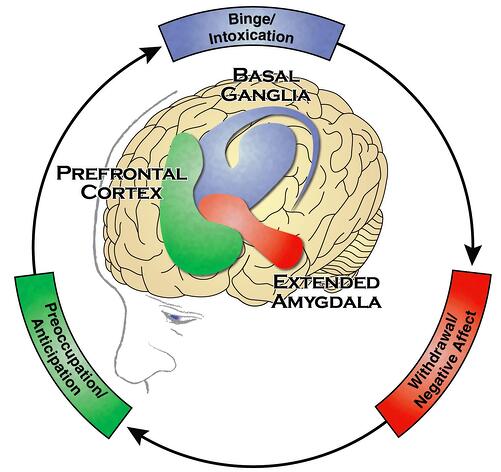If you or a loved one suffers from a substance use disorder, commonly referred to as an “addiction,” you will often feel like one of those hamsters on a wheel. No matter how hard you try, you just cannot seem to get off the nightmare merry-go-round of suffering. You may have tried to quit several times or entered treatment only to fall back into the same old pattern again.
The Addiction Cycle
If you feel like this, it is for a good reason. Substance use disorders can be understood in terms of the “Addiction Cycle.” The Surgeon General’s Report states that, “Addiction can be described as a repeating cycle with three stages. Each stage is particularly associated with one of the following brain regions—basal ganglia, extended amygdala, and prefrontal cortex. This three-stage model draws on decades of human and animal research and provides a useful way to understand the symptoms of addiction, how it can be prevented and treated, and how people can recover from it”.
The three stages are Binge/Intoxication, Withdrawal/Negative Affect and Preoccupation/Anticipation. In this blog series, we will describe each stage in a way that will help you better understand substance use disorders and describe ways to prevent and treat them.
Stage 1: The Binge/Intoxication Stage
The first stage of Addiction is called the Binge/Intoxication stage. This is the stage in which one consumes the substance and feels its effects. Anyone who has consumed enough of a substance such as alcohol can describe, and was aware of, the feeling of intoxication or “being drunk.” But they might not know what was going on in the “pleasure” center of their brain: the basal ganglia. Many substances such as alcohol or opioids have effects on the basal ganglia that result in the person feeling actual pleasure. “I like the feeling of being drunk.” That is because alcohol causes the release of natural opioids and the “pleasure” neurotransmitter: dopamine. So, in fact, drinking alcohol makes you “feel” good.
Chronic use of a substance such as alcohol can lead to changes in the basal ganglia that make it harder to feel the “pleasurable” effects, thereby increasing the need for alcohol.
One of the effective ways of treating such alcohol and opioid use disorders is to use medication that blocks these pleasurable effects in the brain. There are evidence-based treatments that can be taken either as a daily pill or a monthly injection that can stop this key part of the addiction cycle.

Reach Out To An Experienced Addiction Recovery Center
If you or a loved one is struggling with this or any stage of addiction, please reach out to our team for more information by calling 202.618.9125 or by contacting us online.
